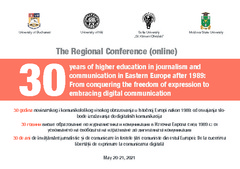Приказ основних података о документу
How media directly impact society: a psychometric analysis of leading Twitter news profiles and their followers in Serbia
| dc.creator | Bojić, Ljubiša | |
| dc.date.accessioned | 2021-10-28T15:55:51Z | |
| dc.date.available | 2021-10-28T15:55:51Z | |
| dc.date.issued | 2021 | |
| dc.identifier.uri | http://rifdt.instifdt.bg.ac.rs/123456789/2365 | |
| dc.description.abstract | We conducted quantitative psychometric analysis on Twitter posts of 20 leading Serbian media in duration of three months. On the other side, we did the same kind of processing for their followers, including more than half million of tweets. The analysis has been done using Twitter API on posts data from 24 October until 30 January of 2019, Serbian LIWC psychometric dictionary and further statistical processing. We discovered that language used by media differs according to their nature and contents they produce. At the same time we found that categories and words related to family, feel, sex, spirituality, negative emotions and work, expressed in posts of media, are predictors for tweets of their followers. This actually means that if media reports consist of these elements, they will reflect in language of their followers. Thus, impact of media on their audiences is clearly registered in the language of Twitter users. Such findings confirm the power of media and indicate how important it is to carefully choose media contents that are consumed, having in mind of various potential hazards, including media addiction. Results align with emotional contagion theory. This research was the first one to indicate various psychometric categories could spread on social media, beyond solely emotions. This research is limited to assessment of media impact in one country. The study indicates it would be important to focus further research on negative news and how they affect multiple societies and groups of people and establish live Media Negativity Index on global level. | sr |
| dc.language.iso | en | sr |
| dc.relation | info:eu-repo/grantAgreement/MESTD/inst-2020/200025/RS// | sr |
| dc.rights | openAccess | sr |
| dc.rights.uri | https://creativecommons.org/licenses/by/4.0/ | |
| dc.source | 30 years of higher education in journalism and communication in Eastern Europe after 1989: From conquering the freedom of expression to embracing digital communication | sr |
| dc.subject | psychometric analysis | sr |
| dc.subject | sr | |
| dc.subject | social media impact | sr |
| dc.subject | big data | sr |
| dc.subject | LIWC | sr |
| dc.subject | digilab | sr |
| dc.title | How media directly impact society: a psychometric analysis of leading Twitter news profiles and their followers in Serbia | sr |
| dc.type | conferenceObject | sr |
| dc.rights.license | BY-NC-ND | sr |
| dcterms.abstract | Бојић, Љубиша; | |
| dc.type.version | publishedVersion | sr |
| dc.identifier.fulltext | http://rifdt.instifdt.bg.ac.rs/bitstream/id/8354/bitstream_8354.pdf | |
| dc.identifier.rcub | https://hdl.handle.net/21.15107/rcub_rifdt_2365 |

